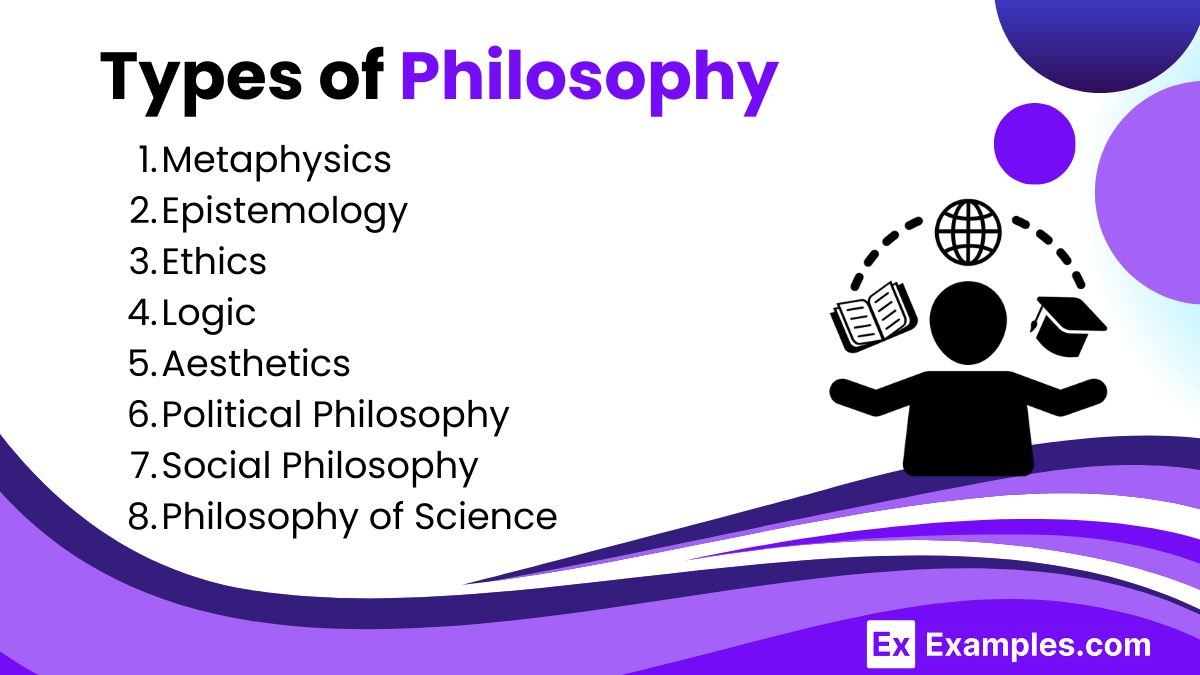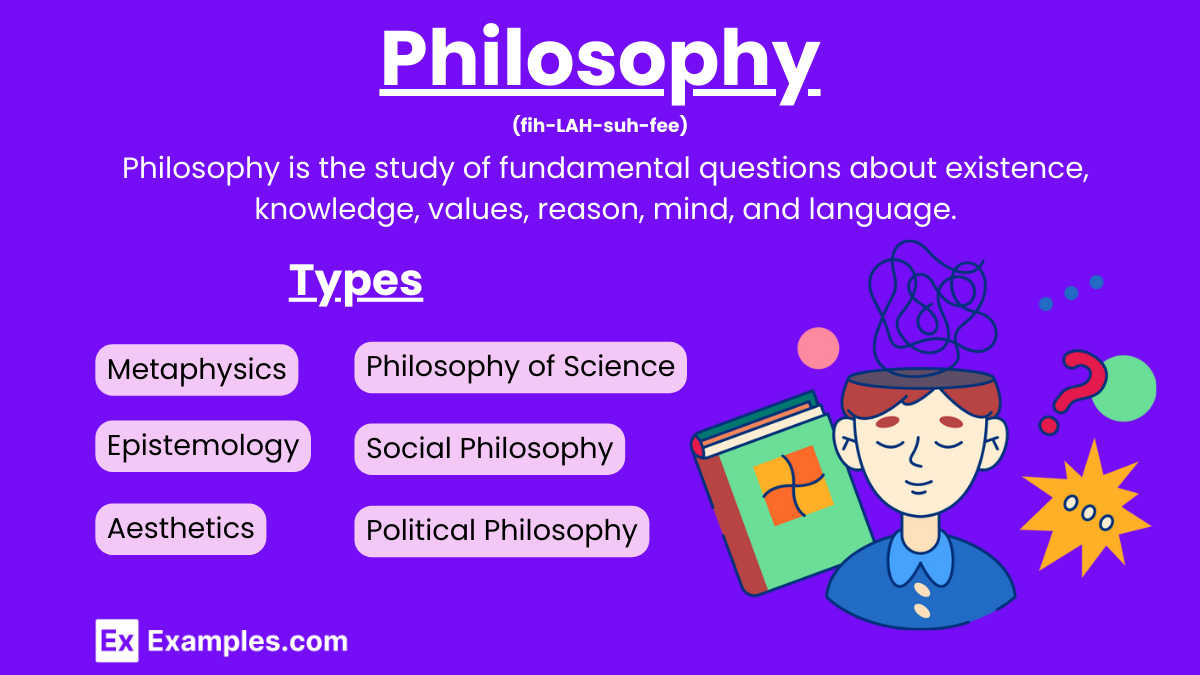26+ Philosophy Examples
Philosophy is the study of fundamental questions about existence, knowledge, values, reason, mind, and language. It involves examining the nature of reality and human experience through critical thinking and logical analysis. Additionally, organizational knowledge refers to the information and skills that are crucial for the effective functioning of an organization. Product knowledge involves understanding the features, benefits, and use of products, which is essential for sales and customer service roles. Job knowledge evaluation assesses an individual’s understanding of their specific role and responsibilities. Ensuring effective knowledge communication is key to achieving the objective of sharing and utilizing information efficiently within any context.
What is Philosophy?
Philosophy is the study of fundamental questions about existence, knowledge, values, reason, mind, and language. It involves the critical examination of the assumptions and concepts that underpin our understanding of the world. A teaching philosophy outlines an educator’s approach to instruction and student engagement, reflecting their beliefs about learning and education. Writing a philosophy paper involves exploring and arguing about these profound questions, often requiring deep analysis and critical thinking. A leadership philosophy defines a leader’s values, principles, and approaches to guiding others, influenced by their understanding of human nature and ethical leadership.
Examples of Philosophy
- Existentialism
- Utilitarianism
- Stoicism
- Nihilism
- Rationalism
- Empiricism
- Absurdism
- Pragmatism
- Hedonism
- Idealism
- Realism
- Materialism
- Dualism
- Phenomenology
- Deontology
Types of Philosophy

1. Metaphysics
- Description: The branch of philosophy that explores the nature of reality, existence, and the fundamental nature of being.
- Examples: Questions about what exists beyond the physical world, inquiries into the nature of time, space, and causality.
2. Epistemology
- Description: The study of knowledge, its scope, and its limits.
- Examples: Investigating the nature and origins of knowledge, exploring the concepts of belief, truth, and justification.
3. Ethics
- Description: The branch of philosophy that deals with moral principles and values, guiding how individuals should behave.
- Examples: Determining what is right and wrong, good and bad, discussing moral duties and virtues.
4. Logic
- Description: The study of reasoning, argumentation, and the principles of valid inference.
- Examples: Analyzing the structure of arguments, understanding the rules of logical consistency and validity.
5. Aesthetics
- Description: The branch of philosophy that examines the nature of art, beauty, and taste.
- Examples: Questions about what makes something beautiful or artistic, discussions on the value and interpretation of art and culture.
6. Political Philosophy
- Description: The study of concepts and principles related to government, justice, rights, and the role of individuals in society.
- Examples: Exploring theories of democracy, justice, and freedom, examining the legitimacy of governments and the rights of citizens.
7. Social Philosophy
- Description: The branch that examines questions about society and its institutions.
- Examples: Inquiries into the nature of social justice, social institutions, and social behavior, discussions on the role of individuals within a community.
8. Philosophy of Science
- Description: The study of the assumptions, foundations, and implications of science.
- Examples: Investigating the nature of scientific inquiry, exploring the relationship between science and truth.
History of Philosophy
The history of philosophy traces the development of human thought from ancient times to the modern era, beginning with the early Greek philosophers like Socrates, Plato, and Aristotle, who laid the foundations of Western philosophy by exploring ethics, metaphysics, and epistemology. In the Middle Ages, philosophical thought was heavily influenced by religious doctrine, particularly within Islamic, Christian, and Jewish traditions. The Renaissance rekindled interest in classical philosophy, paving the way for the Enlightenment, where thinkers like Descartes, Locke, and Kant focused on reason, science, and individualism. The 19th and 20th centuries saw the emergence of diverse philosophical movements such as existentialism, phenomenology, and analytic philosophy, with influential figures like Nietzsche, Heidegger, and Wittgenstein. Today, philosophy continues to evolve, addressing contemporary issues through various lenses including feminism, postmodernism, and environmental ethics.
How Philosophy Helps Us Understand the Mind and Ourselves
Deepens Self-Awareness
- Exploration of Self: Philosophy encourages the exploration of fundamental questions about our identity, purpose, and the nature of our existence, fostering a deeper understanding of who we are.
- Reflection: It promotes self-reflection and introspection, helping us to examine our thoughts, beliefs, and values.
Clarifies Thought Processes
- Critical Thinking: Philosophy teaches critical thinking and logical reasoning, enabling us to analyze and clarify our thought processes.
- Problem-Solving: It provides tools to approach complex problems systematically and thoughtfully.
Enhances Emotional Understanding
- Emotional Intelligence: By studying philosophical theories of emotion, we gain insights into how emotions influence our behavior and decision-making.
- Mindfulness: Philosophical practices, such as mindfulness and stoicism, help us manage and understand our emotions better.
Philosophy in Life
- Helps us determine what is right and wrong, guiding our moral decisions.
- Encourages integrity and accountability in our actions.
- Teaches us to analyze arguments and identify logical fallacies.
- Promotes skepticism and the questioning of assumptions.
- Offers insights into different worldviews and cultures.
- Encourages empathy and understanding of others’ experiences and beliefs.
- Promotes self-reflection and introspection.
- Helps us understand our values, beliefs, and purpose.
- Inspires a continuous quest for knowledge and wisdom.
- Supports intellectual curiosity and open-mindedness.
- Provides tools to evaluate options and consider consequences.
- Encourages thoughtful and informed choices.
Philosophy in Education
- Guides the development of educational goals and curricula.
- Encourages critical thinking and analytical skills in students.
- Promotes the importance of lifelong learning and intellectual curiosity.
- Helps in understanding different learning styles and teaching methods.
- Fosters a sense of moral and ethical responsibility in students.
- Supports the development of a well-rounded individual through the integration of various disciplines.
- Encourages the questioning of assumptions and the exploration of new ideas.
- Promotes an inclusive and equitable learning environment.
- Enhances the ability to make informed and thoughtful decisions.
- Cultivates a sense of self-awareness and personal growth in students.
Business Philosophy
- Defines the core values and principles guiding the business.
- Shapes the company culture and work environment.
- Provides a framework for decision-making and problem-solving.
- Enhances customer trust and loyalty through ethical practices.
- Drives long-term strategic planning and goal setting.
- Promotes social responsibility and sustainable practices.
- Encourages innovation and continuous improvement.
- Fosters strong relationships with stakeholders, including employees, customers, and partners.
- Supports a commitment to quality and excellence in products and services.
- Aligns business operations with the mission and vision of the company.
Uses of Philosophy
- Critical Thinking and Analytical Skills: Philosophy trains individuals to think critically and analytically. It teaches how to evaluate arguments, identify logical fallacies, and approach problems systematically, which is valuable in all areas of life.
- Ethical Decision Making: Philosophical ethics provides frameworks for understanding and resolving moral dilemmas. It helps individuals and organizations make principled decisions by considering the implications and consequences of their actions.
- Enhancing Communication: Philosophy improves communication skills by teaching clear and precise articulation of ideas. It emphasizes logical structure, coherence, and the effective presentation of arguments, which enhances both written and verbal communication.
- Personal Development and Self-Understanding: Philosophy encourages introspection and self-reflection. It helps individuals understand their beliefs, values, and motivations, leading to greater self-awareness and personal growth.
- Informed Citizenship: Philosophy fosters informed and active citizenship. It encourages critical examination of political systems, policies, and ideologies, helping individuals engage thoughtfully in civic and public life.
- Intellectual Curiosity and Lifelong Learning: Philosophy nurtures a love for wisdom and continuous learning. It inspires intellectual curiosity and a desire to explore diverse perspectives and ideas, promoting lifelong education.
- Problem Solving and Innovation: Philosophical thinking encourages creative problem solving and innovation. It challenges conventional wisdom and explores new ways of thinking, leading to novel solutions and advancements in various fields.
- Understanding Human Experience: Philosophy provides insights into the human condition, exploring themes like meaning, purpose, suffering, and happiness. It helps individuals navigate life’s challenges and find personal fulfillment.
- Interdisciplinary Connections: Philosophy intersects with many other disciplines, including science, art, religion, and politics. It offers tools for integrating knowledge across fields, fostering a holistic understanding of complex issues.
Who is considered the father of Western philosophy?
Socrates is considered the father of Western philosophy due to his contributions to ethics and epistemology.
What are the main branches of philosophy?
The main branches of philosophy are metaphysics, epistemology, ethics, logic, and aesthetics.
What is metaphysics?
Metaphysics explores the nature of reality, existence, and the relationship between mind and matter.
Who are some famous existentialist philosophers?
Famous existentialist philosophers include Jean-Paul Sartre, Friedrich Nietzsche, and Albert Camus.
What is the Socratic method?
The Socratic method involves asking and answering questions to stimulate critical thinking and illuminate ideas.
What is dualism?
Dualism is the belief that reality consists of two fundamental substances: mind and matter.
What is utilitarianism?
Utilitarianism is the ethical theory that actions are right if they promote the greatest happiness for the greatest number.
What is deontology?
Deontology is the ethical theory that emphasizes duty, rules, and obligations over consequences.
What is phenomenology?
Phenomenology studies structures of consciousness and phenomena as they appear to our experiences.
What is the philosophy of mind?
The philosophy of mind explores the nature of consciousness, mental states, and their relationship to the physical body.



